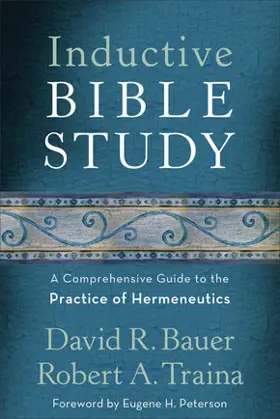

Inductive Bible Study: A Comprehensive Guide to the Practice of Hermeneutics
Pages
384
Publisher
Baker Academic
Published
2011
ISBN-13
9780801027673
Robert Traina's classic Methodical Bible Study transformed the way many people studied the Bible in the latter half of the twentieth century and became recognized as the most authoritative presentation of inductive Bible study available. This new work introduces the practice of inductive Bible study to a new generation of students, pastors, and church leaders. The authors, two seasoned educators with over sixty combined years of experience in the classroom, offer guidance on adopting an inductive posture and provide step-by-step instructions on how to do inductive Bible study. They engage in conversation with current hermeneutical issues, trends, schools, and figures as they set forth well-grounded principles and processes for biblical interpretation and appropriation.
The book offers a holistic and integrated approach to the study of the Bible, showing how readers can bring together the various facets and methods of biblical study to arrive at original, penetrating, well-grounded interpretation and contemporary appropriation. The process presented incorporates various methods of biblical study to help readers hear the message of the Bible on its own terms. Inductive Bible Study includes a sustained example of the entire process, using 2 Timothy 3:16-17, and many examples of specific aspects or tasks of biblical study taken from passages throughout the biblical canon. It will benefit professors and students in courses on Bible study methods, interpretation, and hermeneutics as well as pastors and church leaders.
Contents
- Foreword by Eugene H. Peterson
- Introduction
- Part 1: Theoretical Foundations
- 1. Inductive Study
- 2. Transjective Study
- 3. Intentional and Rational Study
- 4. Re-Creative Study
- 5. Direct Study
- 6. Comprehensive and Integrated Study
- 7. Individual and Communal Study
- 8. Compositional Book Study
- 9. Canonical Study
- 10. Flexible Procedural Study
- Part 2: Observing and Asking
- 11. Survey of Books-as-Wholes
- 12. Survey of Parts-as-Wholes (Divisions, Sections, Segments)
- 13. Focused Observation
- Part 3: Answering or Interpreting
- 14. Selecting Questions and Formulating Premises
- 15. Drawing Inferences from the Premises
- 16. Implementing Interpretation
- Part 4: Evaluating and Appropriating
- 17. Description of Evaluation and Appropriation
- 18. Implementing Evaluation and Appropriation
- Part 5: Correlation
- 19. Character and Practice of Correlation
- 20. Implementing Correlation
- Epilogue
- Appendix A: General Discussion of Induction and Deduction
- Appendix B: Presuppositions in Contemporary Hermeneutical Discussion
- Appendix C: Selectivity
- Appendix D: The Use of Original-Language Resources
- Appendix E: Critical Methods in Inductive Bible Study
- Appendix F: Logical Outlines
- Indexes